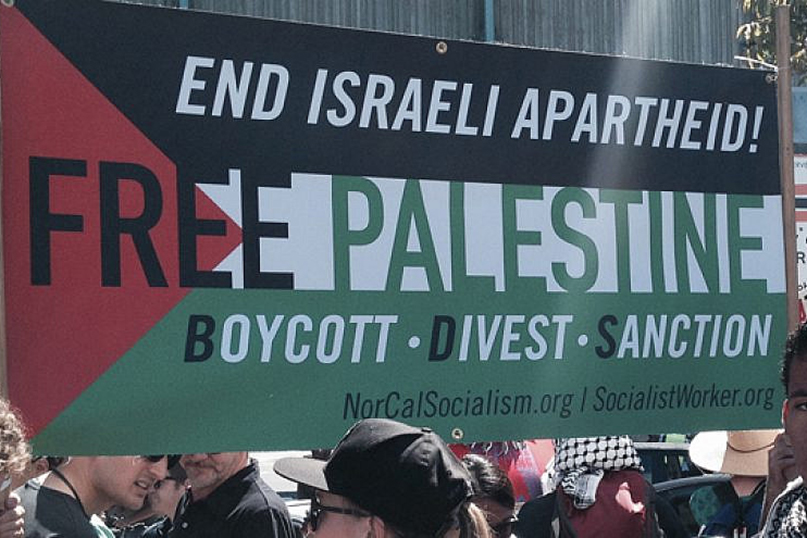
By Richard L. Cravatts
(JNS) In their zeal to construct an academic setting that reflects the true diversity of the nation and attempts to redress past discrimination and exclusion, universities have created “protected” groups of students who are scrupulously shielded against any emotional or ideological assault via university harassment policies and codes of conduct.
There is one group, however, that is absent from the accepted list of protected groups, even though, as a small ethnic and religious minority, they should be recognized as such. That group, perhaps unsurprisingly, is Jewish students, especially Jewish students who openly support Israel.
Both administrators and non-Jewish fellow students believe that Jews enjoy “white privilege” or are at least “white adjacent.” Thus, they see Jews as part of a non-victimized majority. So, when Jewish supporters of Israel are demonized by hate groups like Students for Justice in Palestine (SJP) and falsely accused of being racists, supporters of apartheid, land thieves and oppressors of a wholly innocent indigenous people, most university leaders have refused to recognize this as antisemitism and address the problem.
A new report by the AMCHA Initiative, an organization that tracks campus antisemitism, has documented this atmosphere of depraved indifference towards Jewish students.
“While university officials respond promptly and vigorously to harassing behavior directed at some students,” the report observed, “they ignore or downplay equally harmful acts directed at Jewish and pro-Israel students. This is particularly true when it comes to acts of aggression motivated by anti-Zionism, which constitute the majority of antisemitic incidents on campuses most popular with Jewish students.”
It is important to emphasize that what is euphemistically called “Palestinian activism” is, in fact, a vigorous and often toxic campaign against Israel and its campus supporters. That activism, orchestrated in large part by groups like SJP, does not celebrate the culture and aspirations of the Palestinians at all. To be pro-Palestinian on campus means only one thing: being singularly and venomously anti-Israel. This includes slanders against Zionism, the perverse notion that Israel has become the modern incarnation of the Third Reich and that supporters of Israel—especially Jews—should be condemned for defending an illegal, apartheid regime.
Every time a Boycott, Divestment, and Sanctions (BDS) resolution is railroaded through a student government; every time pro-Israel speakers are shouted down by SJP and other activists; every time Jewish students are told they are ideologically unacceptable for student government positions; and every time the Jewish state is singled out for opprobrium and slander, Jewish students are exposed to what would receive immediate rebuke and censure if directed at any other group on campus.
Jewish students are also at a disadvantage because the abuse they face is largely verbal, the AMCHA report revealed, because “while every school’s Harassment Policy included verbal abuse as a form of harassment, nearly one-quarter of the Codes of Conduct did not include verbal abuse in their descriptions of prohibited behavior. Jewish students at a school with such a Code of Conduct who are not considered eligible for protection under the Harassment Policy have little or no administrative recourse from verbal harassment.”
“While some cases of anti-Zionist motivated harassment may involve actions or threats of action that physically endanger Jewish and pro-Israel students, most do not,” the report noted. “Rather, they involve verbal conduct, which means that the Jewish and pro-Israel students … who are the targets of such behavior will find it very difficult to seek redress under the school’s code of conduct, even if the verbal abuse they are experiencing meets the behavioral threshold for harassment in the school’s harassment policy and is so severe, persistent and pervasive as to limit their ability to participate in campus life.”
All of the 100 public and private universities surveyed in the report defined their harassment policy according to the above criteria, but the report importantly noted, “less than 40% of the Codes of Conduct described harassing behavior in this way,” thus excluding Jewish students from protection.
What is worse, the report noted, “60% of schools most popular with Jewish students do not recognize this crucial impact of the harassing behavior, and are therefore less likely to treat such behavior as seriously as they do when directed at members of ‘protected’ identity groups.”
The report concluded that there is a serious disparity in the way students are protected or not, depending on whether they are members of a perceived “protected” group. For example, abuse of “protected” students is punished more severely than in other cases.
“More than one-third of the schools included in their Codes of Conduct statements affirming that harassment of students in ‘protected’ identity groups would receive more severe punitive sanctions than similar behavior directed against ‘unprotected’ students,” the report revealed, “thereby creating a more robust deterrent against the harassment of students in ‘protected’ identity groups than against Jewish victims.”
The report noted that one school, Harvard University, has proposed new policies “which will guarantee ‘unprotected’ students the administrative consideration of and response to harassing behavior equivalent to that granted ‘protected’ students.” Were other universities to adopt such a balanced set of policies—under which every student, regardless of their membership in a particular group, would receive equal protection and can seek redress for any infractions—this would certainly benefit Jewish students who now, as noted, are generally excluded from those protections.
Jewish students on any campus, whether or not they actively support Israel or are animated by Zionism, should not be abused by poisonous activists and made to pay the price for the alleged predations of Israel simply because they are Jewish.
Richard L. Cravatts, Ph.D., a Freedom Center Journalism Fellow in Academic Free Speech and President Emeritus of Scholars for Peace in the Middle East, is the author of Jew-Hatred Rising: The Perversities of the Campus War Against Israel and Jews.
MAIN PHOTO: Campus supporters of the BDS movement against Israel. Photo by Alex Christy/Flickr.







 Southern New England Jewish Ledger
Southern New England Jewish Ledger












